 Petzlover
Petzlover Both Cairn Terrier and Norfolk Terrier are originated from United Kingdom. Cairn Terrier may grow 7 cm / 3 inches higher than Norfolk Terrier. Both Cairn Terrier and Norfolk Terrier are having almost same weight. Both Cairn Terrier and Norfolk Terrier has same life span. Cairn Terrier may have more litter size than Norfolk Terrier. Cairn Terrier requires Low Maintenance. But Norfolk Terrier requires Moderate Maintenance
Both Cairn Terrier and Norfolk Terrier are originated from United Kingdom. Cairn Terrier may grow 7 cm / 3 inches higher than Norfolk Terrier. Both Cairn Terrier and Norfolk Terrier are having almost same weight. Both Cairn Terrier and Norfolk Terrier has same life span. Cairn Terrier may have more litter size than Norfolk Terrier. Cairn Terrier requires Low Maintenance. But Norfolk Terrier requires Moderate Maintenance
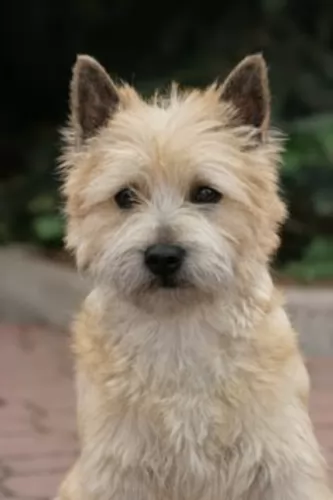 The Cairn Terrier originates in the Scottish Highlands. This feisty little dog was given the name Cairn, as he used to hunt prey between the Scottish cairns. At first the dog was grouped as a ‘Skye Terrier’way back in the 1900s with the Scottish and West Highland White Terrier. Then the different breeds began to be bred separately.
The Cairn Terrier originates in the Scottish Highlands. This feisty little dog was given the name Cairn, as he used to hunt prey between the Scottish cairns. At first the dog was grouped as a ‘Skye Terrier’way back in the 1900s with the Scottish and West Highland White Terrier. Then the different breeds began to be bred separately.
The name Cairn Terrier didn’t appear in print till 1887. It was in 1912 that the Kennel Club of the United Kingdom recognized the Cairn Terrier.
 It was in the 1880s that a working terrier was developed in eastern England. The Norfolk Terrier was developed by crossing local terrier-like dogs with the Irish Terrier breed as well as small red terriers.
It was in the 1880s that a working terrier was developed in eastern England. The Norfolk Terrier was developed by crossing local terrier-like dogs with the Irish Terrier breed as well as small red terriers.
Known first as the Cantab Terrier and then later as the Trumpington Terrier, the name changed further but in 1932, the Norwich was accepted into the English Kennel Club and the first written standard was created.
The Norfolk Terrier was recognized by the United Kennel Club in 1979. It has gained recognition as an independent breed but is a variety of the Norwich Terrier, distinguished from it by having floppy ears and not erect ears. Both the Norfolk- and Norwich are the smallest of the working terriers.
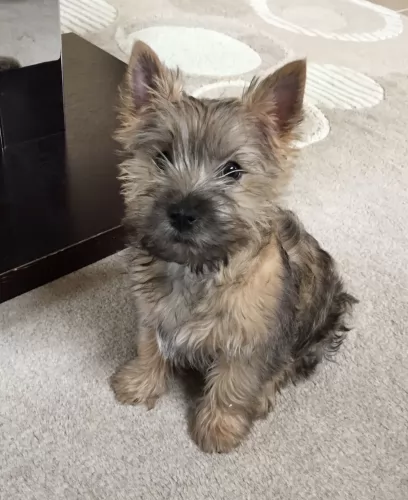 The small sturdily built working Terrier is intelligent and courageous. Bright-eyed, he is small and active and he just loves to work- and party hard with his human family. You’ll see if you’ve got a ball you want to throw for him, his tail is quivering in anticipation and his ears are erect and alert to any noise. He is smart, independent and courageous.
The small sturdily built working Terrier is intelligent and courageous. Bright-eyed, he is small and active and he just loves to work- and party hard with his human family. You’ll see if you’ve got a ball you want to throw for him, his tail is quivering in anticipation and his ears are erect and alert to any noise. He is smart, independent and courageous.
The Cairn Terrier has a tough, weather-resistant coat that can be any color but not white. He has a waterproof double coat – the outer one being wiry while the undercoat is soft. You’ll find the coat in man colours such as grey, black, red and brindle with dark points on the ears and muzzle.
The interesting thing with a Cairn is that when you get a puppy, you can’t be sure what color he will end up being as it changes over the years. The ears are fox-like, small and erect, and the natural medium-to-short tail is held straight out.
 The Norfolk Terrier is a small purebred dog, standing at 23 to 25cm in height and weighing roughly between 4.5kg and 6kg. The dog has a wire-haired coat which can be in different colors such as wheaten, red, black and grey or grizzle.
The Norfolk Terrier is a small purebred dog, standing at 23 to 25cm in height and weighing roughly between 4.5kg and 6kg. The dog has a wire-haired coat which can be in different colors such as wheaten, red, black and grey or grizzle.
The hair on his head and ears is shorter and smoother and he has longer whiskers and eyebrows. The chest is deep, the front legs are short and straight and the tail has always been docked to half its length but left long these days. The tail is set high and carried erect.
Norfolks are feisty, fearless dogs with an independent streak. They’re gentle though, and when it comes to being a companion dog, they get on well with children and other pets. They thrive on their human family’s companionship and wouldn’t do well at all if they were constantly left outside.
They’re not yappy dogs but will bark occasionally so he can sound the alarm if strangers approach.
This little dog is able to live in the city or the countryside, but just because he is little, you can’t neglect his exercise needs. He will most certainly need to be exercised every day and taken for walks as he is an energetic, lively dog. He is intelligent too and easy to train and socialize, turning him into such an obedient, pleasurable pet.
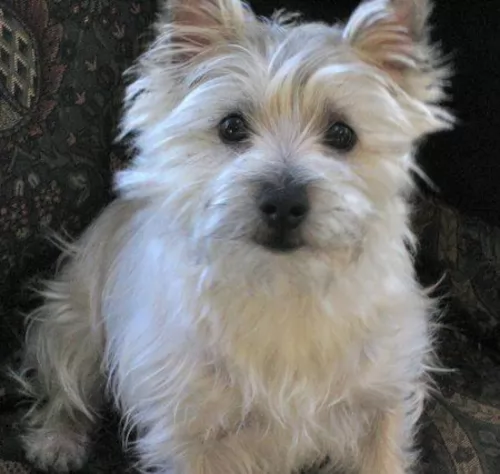 The Cairn Terrier is a fearless, jaunty little dog, known for his courageous spirit and inquisitive nature. He may be small, but he is stubborn. He will respond well to training and socialization which will turn him into the most awesome pet for families. He can make a wonderful friend and playmate for children too. Socialization and training ensures he gets on well with other pets in the household too.
The Cairn Terrier is a fearless, jaunty little dog, known for his courageous spirit and inquisitive nature. He may be small, but he is stubborn. He will respond well to training and socialization which will turn him into the most awesome pet for families. He can make a wonderful friend and playmate for children too. Socialization and training ensures he gets on well with other pets in the household too.
He is small and energetic, and therefore not the kind of dog you can ignore in terms of exercise. He’ll need a good walk every day and he just loves to chase a ball as it takes him back to the days when he was used to chasing- and catching mice.
He isn’t your typical lap-dog at all and with the right care he becomes a devoted, loyal and loving companion.
 Fearless and brave, the Norfolk Terrier promises to be a wonderful companion.
Fearless and brave, the Norfolk Terrier promises to be a wonderful companion.
They're social, loving dogs and want to be part of the household. He is lively and active too and wants to be included in your walks and your games. He loves nothing more than to be running across a field after a ball.
They’re such amicable pets that they make great dogs for first-time dog owners. Let him into your heart and your home – he makes such a splendid pet – that once you’ve had one, you’ll realize you can never be without such a wonderful pet and companion again.
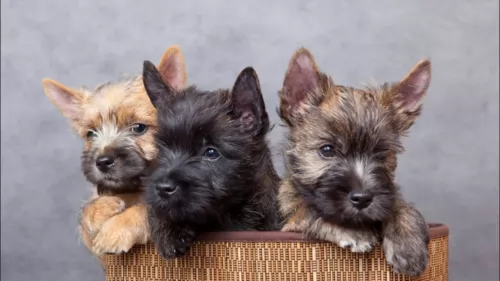 The Cairn Terrier is a robust little dog, and with good care can reach 14 years of age and even older. However, with every dog breed there are some health concerns particular to that breed. With your Cairn Terrier look out for a disease known as Globoid cell leukodystrophy (GCL).
The Cairn Terrier is a robust little dog, and with good care can reach 14 years of age and even older. However, with every dog breed there are some health concerns particular to that breed. With your Cairn Terrier look out for a disease known as Globoid cell leukodystrophy (GCL).
Known also as Krabbe Disease, Globoid cell leukodystrophy (GLD) is a rare but fatal disease. It is caused by a mutation on the dog’s DNA. There is abnormal processing of an enzyme needed for the production of myelin, a substance that protects the nerves in the brain and spinal cord. The dog is weak, it has tremors and isn’t co-ordinated. The Cairn Terrier is a breed of dog more susceptible to GCL.
Your Cairn Terrier may well suffer with joint diseases. These diseases, such as luxating patella which is about loose knee joints, and hip dysplasia which is a degenerative hip disease, can cause plenty of pain and discomfort for your pet.
Glaucoma is an eye disease where there is pressure on the eye, causing inadequate fluid drainage. Without treatment, there can be damage to the optic nerve which can lead to blindness.
 The life expectancy of your Norfolk Terrier is 8 to 14 years, but there are some who have received excellent care and who have reached 17 years of age.
The life expectancy of your Norfolk Terrier is 8 to 14 years, but there are some who have received excellent care and who have reached 17 years of age.
Just as with any other dog, they are prone to common dog illnesses, and these can include dental issues and mitral valve disease. They also are prone to hip dysplasia, and according to the Orthopedic Foundation for Animals (OFA) they are known for problematic hips.
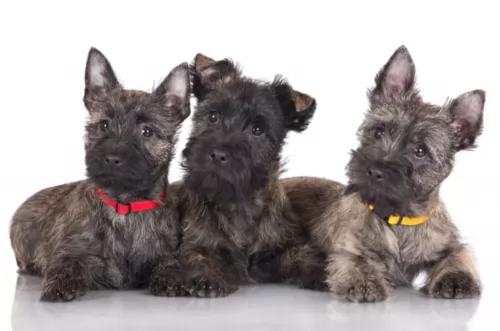 The Cairn Terrier sheds very little and the coat is easy to groom. Give him a thorough brushing twice a week to rid him of loose hairs. Some trimming will be needed as the coat can become shaggy and unruly.
The Cairn Terrier sheds very little and the coat is easy to groom. Give him a thorough brushing twice a week to rid him of loose hairs. Some trimming will be needed as the coat can become shaggy and unruly.
Brush his teeth at least 2 or 3 times a week to prevent tartar build up that can lead to bacteria, gum disease and possible tooth loss.
The Cairn Terrier is small but he is an active dog and therefore needs to be on a high-quality dog food. If you feed him a commercially manufactured food, make sure its appropriate to his age, size and activity levels.
He is a small dog so you want to be careful about not letting him become overweight. Try and alternate his commercially manufactured food with some home-made rice, vegetables and meat and also include some raw meat in from time to time. This is of particular importance as chronic skin allergies are common in all terrier breeds. Make sure that there is always a clean bowl of fresh water available to him day and night.
 The Norfolk Terrier’s hard, wiry, straight coat requires being hand stripped about twice a year by hand or with a stripping knife. The paws will also need to be trimmed.
The Norfolk Terrier’s hard, wiry, straight coat requires being hand stripped about twice a year by hand or with a stripping knife. The paws will also need to be trimmed.
It is recommended to keep the hair short around the anus for hygienic purposes and the tail itself will need to be stripped.
The Norfolk doesn’t shed his coat naturally, and the hair keeps growing, making the dog uncomfortable and ungroomed looking. The dog will certainly need to have his hair kept away from around the eyes.
If you don’t want to strip your dog, there are people who take their dogs to professional groomers, but then this professional grooming makes it that the texture of the dog’s coat changes from wiry to soft.
Small dogs are prone to dental problems, so check your dog’s teeth regularly. A bad tooth can play havoc with your dogs general health.
As with any other dog, the Norfolk Terrier will do well on high-quality kibble, specially formulated for small dog breeds. For a tasty treat, boil some chicken and vegetables such as sweet potato, carrots and spinach in a pot, chop them up and add to his kibble with some brown rice and pasta. A tiny bit of raw meat added in occasionally is all this little dog needs to stay healthy and content.
Don’t ‘treat’ him by giving him chocolates, chips and peanuts. You will upset his stomach. Dogs do best on simply, healthy, tasty diets such as mentioned above. Make sure he has a constant supply of fresh, cool water.